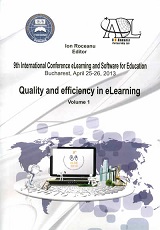RESEARCH ON THE ADEQUACY OF THE FORMS OF TRAINING TO BENEFICIARY’S NEEDS AND ANALYSIS OF THE ASSESSMENT OF MILITARY STUDY PROGRAMS’ EFFECTIVENESS
RESEARCH ON THE ADEQUACY OF THE FORMS OF TRAINING TO BENEFICIARY’S NEEDS AND ANALYSIS OF THE ASSESSMENT OF MILITARY STUDY PROGRAMS’ EFFECTIVENESS
Author(s): Cătălin Bursuc, Andreea Neagu, Cristian TeodorescuSubject(s): Education
Published by: Carol I National Defence University Publishing House
Keywords: effective training programs; training beneficiaries; institution’s prestige
Summary/Abstract: The effectiveness of a program of studies is reflected in how beneficiaries appreciate its effects. In the research beneficiaries are considered to be the heads / the commanders of the staff that attended military education programs. Beneficiaries will express their opinions on the increase in their staff’s professional performance and efficiency after graduating training programs. The research uses two questionnaires as instruments: the first one is addressed to the beneficiary, the second one is addressed to the graduates. In this way, the tools allow a comparative analysis of how effective are perceived the training programs organized in “Carol I” National Defense University. Questionnaires’ organization captures variables that characterize the educational process and it responds to the training that the Ministry of Defense needs. The tools applied aim also the promptness of the educational institution in updating its contents in response to the challenges of a society being in a full integration process into supranational structures. Another variable that is the subject of this research in the change in labor efficiency in completion of a study program. This variable is mediated, being registered as the perception basses have on the subordinates that have graduated study programs. Although it may seen a subjective treatment of the problem, this approach is integrated in the staff’s evaluation process in accordance with the regulations governing the human resources domain in the Romanian Army. The investigated population is the staff of the General Staff, as the main structure beneficiary of training programs. The way the sample was designed does not allow generalization of the results to all the graduates. Following the research one can formulate qualitative conclusions with mid-level generalization, which gives stability and justify the research approach.
Journal: Conference proceedings of »eLearning and Software for Education« (eLSE)
- Issue Year: 9/2013
- Issue No: 01
- Page Range: 386-393
- Page Count: 8
- Language: English

